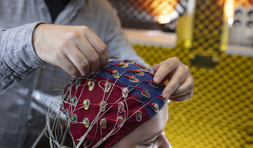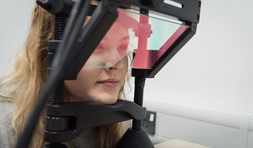Module Overview
The module extends the investigations of cognition that began in the first year. Areas critical to our understanding of cognition are considered in more depth, with consideration of both classic and current research into cognitive processes from both a cognitive and cognitive neuroscience approach.
Module Overview
This module aims to examine the concepts, theories, research methods and influencing factors in child development relevant to the period from birth to pre-adolescence.
Module Overview
The module aims to provide an introduction into psychological assessments using psychometrics, including questionnaires and scales. Based on the established theoretical and research context, this module will consider a range of assessment tools used in psychology to assess an individual’s behaviour or behavioural disposition, and provide an introduction into psychometric test development. The modules also aims to provide students with the opportunity to administer, score, and interpret psychological tests.
Module Overview
This module aims to showcase how research is applied in practice, in policy and in the context of the Sustainable Development Goals (SDG) and social responsibility. In lectures, students will be introduced to examples of how research is applied in the workplace, how research is used to shape policy, and how research relates to the SDGs and social responsibility. In parallel, a series of workshops will teach students to apply this knowledge. This module develops the following Skills for Life: global mindset, leadership & influence, active learning, critical thinking, solving complex problems and equality & inclusion. Specifically, on this module, students will develop their global mindset and leadership & influence through considering how research is applied in a global context, including contributing to the SDGs and writing for a general audience. By developing a dissertation proposal, students will be active learners, required to think critically and solve complex problems while centring equality and inclusion.
Module Overview
This module seeks to explore some of the central issues of social psychology, including how people deal with social information, such as the causes of behaviour and social categories, and how groups function and interact.
Module Overview
This module aims to examine the relationship between neural structure and psychological function by examining convergent evidence from the domains of neuropsychology, neurophysiology and neural networks. The module seeks to consider methodological and theoretical issues that underpin the relationship between brain and behaviour.
Module Overview
This module introduces undergraduate students to the application of the science and practice of Positive Psychology applied to the workplace, specifically focusing on the understanding and evaluation of Character Strengths research and interventions. The module will provide a comprehensive introduction to the theory and practice of Character Strengths psychology, based on the VIA Inventory of Strengths, with particular application to the workplace. It covers the outcome literature on using higher strengths in life and work, the relationship of strengths based practices with mental health, the use of strengths to overcome challenging situations, how strengths can be used to manage teams and projects, strengths-based leadership and its effect on a system, and the use strengths with mindful practice for productivity.
Module Overview
This module aims to introduce students to key mechanisms in evolutionary theory and seeks to illustrate evolutionary processes in action with reference to a number of examples of animal physical and behavioural adaptations.
Module Overview
This optional, year-long module enables students to spend a year studying abroad at one of the University’s approved partner institutions. Eligible students must have completed their second year of study to a satisfactory standard and successfully completed the application process for the year abroad. During the year spent abroad, students share classes with local students and study on a suite of locally-delivered taught modules which have been approved in advance by the University. Upon their return, as part of the assessment for this modules, students are required to critically reflect upon their experience of living and studying in a different cultural environment and the skills acquired.
Module Overview
The main purpose of this module is to create a valuable opportunity for students to gain important insights and improve their skills and prospects relevant to employment or further study (within psychology or related subject areas) by undertaking relevant work experience.
Module Overview
This module considers theories and methods on human-animal interaction, considering the benefits and disadvantages for humans but also for animals of this interaction (e.g., animal assisted therapy for humans, coping with the results of environmental degradation by animals). The module is an option for second year psychology students, with its teaching being supported by research active staff.
Module Overview
The module provides an introduction to the prison context. Based on established theoretical, research and operational context, the module will critically examine the various departments and functions within prisons in order to provide a greater understanding of the psychological experiences of people detained within prison custody. The module aims to provide students with an understanding of the complexity of prisons, predominantly in England and Wales, and will provide opportunities for critical debate to analyse and synthesise module content.
Module Overview
This module focuses on the psychological mechanisms involved in aggressive and peaceful interactions, and on the social and ecological causes/consequences of aggression, war and peace. It uses a multi-disciplinary approach, reviewing theories from psychology, economics, evolutionary biology and anthropology, and examples from lab experiments and field observations in complex human societies and hunter-gatherers, non-human animals, archaeological records, historical events, politics and economics.
Module Overview
This module expects students to carry out empirical research on a cutting-edge topic. In preparation for the module, interested students will have the opportunity to consult with relevant academic staff to identify an appropriate research project. Students are expected to work closely with a research tutor, who has research expertise in the chosen area.
Module Overview
This module aims to broaden the understanding of mental health to encompass psychological well-being. Based on the established theoretical and research context, this module will consider an additional range of psychological disorders in terms of their assessment, aetiology, research background, and impact on the individual’s functioning and the environment they interact in.
Module Overview
This module aims to create a valuable opportunity for students to gain important insights and improve their skills and prospects relevant to employment or further study (i.e. within psychology or related subject areas) by undertaking relevant work experience.



-700x560.jpg)












